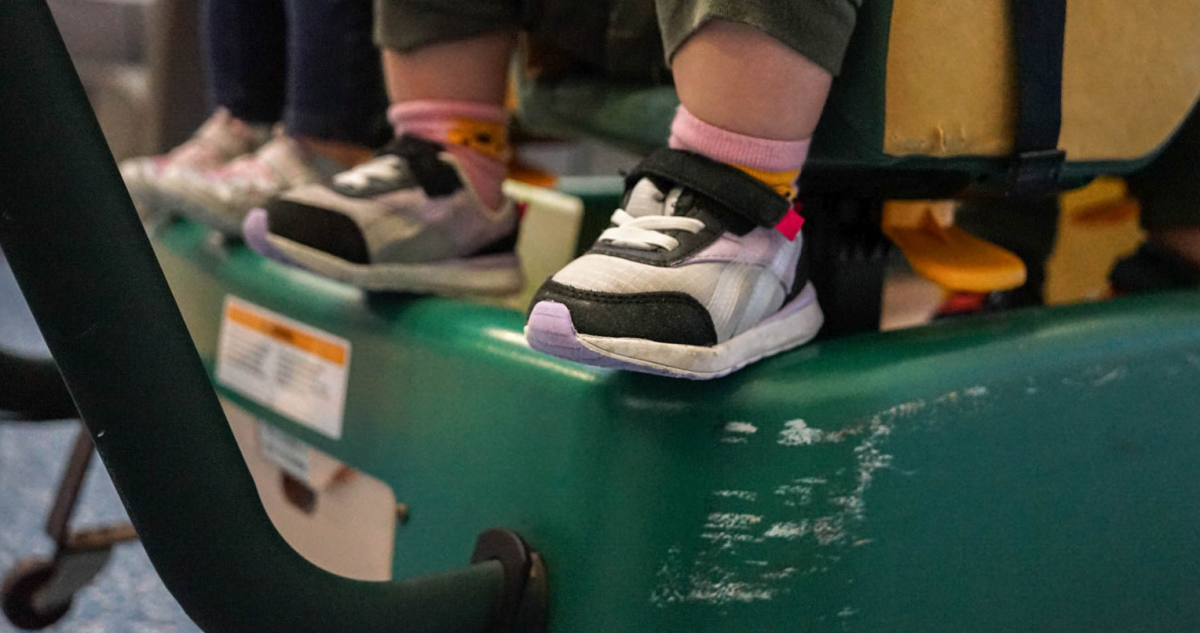It is no secret that teachers and childcare workers usually lack substantial wages, but what you may not know, is that student employees within education and childcare at Winona State University receive minimum wage while their peers make more.
Many front desk job options on campus pay closer to around $13.00 per hour while allowing students to do homework during their shift. Ironically enough, the students in charge of the safety, teaching and overall caretaking of children make $10.59 per hour. Open from 7 a.m. to 5 p.m., there is never a dull day at the Winona State University Children’s Center.
Maliah Pease is a third-year student at Winona State, and this year she works as a teacher’s assistant at the Children’s Center. She made more money at her previous job as desk assistant in Kirkland Hall and described the jobs to be vastly different.
“A lot of people think that when you go into work at a daycare, and you teach children, that you’re just playing with kids all day, but it’s really like you’re keeping their schedules, you’re changing their diapers, you’re changing their clothes, you’re keeping them clean,” Pease said.
Another student employee, who preferred to remain anonymous, described the experience of working in the infant room at the WSU Children’s Center.
“For me, just from talking to other people who work on campus and knowing that they can like sit and do homework and get paid more is frustrating because everyone who works at the Winona State Children’s Center is like actually taking care of fifteen to eighteen babies, at least in the infant room,”
(Source A).
Casey Christionsen is a third-year student at Winona State. Teacher Certified, Christionsen is working in the infant room for her third semester. Christionsen enjoys the experience and routine of every shift, and never dreads going into work. While she has a passion for kids and loves her job, it can still be tough having to care for so many infants.
“It’s a lot of just having like a lot of patience with the kids and like taking a deep breath when you’re stressed and when there’s like five babies crying and you can’t make all of them happy,” Christionsen said. “And there is just a lot of like running around, back and forth going on, the whole day. There is a lot of that.”
Christionsen mentioned that her friends at desk jobs make around $13.00 per hour, while simultaneously getting their homework done. She was also frustrated by the fact that all student employees at her location earn the same amount, meaning that someone who started yesterday and is still learning will also make $10.59 per hour, even though Christionsen is over a year into the job.
“There was a period last year where we were told we were going to get this huge raise and it ended up being like 30 cents,” Christionsen said. “So that was discouraging.”
Karen Sullivan started off as a school age teacher, and two years later she was asked to step in as Director of the Winona State University Children’s Center. She has been in this role ever since.
“When you’re looking at how we compare to the rest of the univer- sity, the WSU Children’s Center
is a private, nonprofit, tax exempt program,” Sullivan said. “We are tuition driven. What that means is that our families pay tuition every week, and out of that tuition, we pay our teachers, we pay for food, and we pay for supplies, and we pay for licensing. We never get ahead.”
Most recently, the program has been working to receive a new playground and this construction was finally made possible by fundraising alone. Even to keep up with new toys, supplies, and basic class- room necessities can be difficult.
Sullivan continues to explain how the program works, along with its affiliation with Winona State. The Children’s Center is individual and separate from any funding other than its own tuition dollars. Many other jobs outside of the WSU Children’s center will still pay minimum wage, or only slightly above minimum wage, as it is a common issue within child-care and education roles.
Another aspect unique to those working at the Children’s Center is maintaining the ratio of staff members to children, which is to be taken seriously to adhere to regulations and ensure the safety of the children. With 46 student employees, and a licensed teacher in every room, managing the ratio is an important task.
“If we do not show up, then they do not even have anybody and then those babies, they are out of ratio… And the babies cannot be cared for or toddlers or preschoolers,” Pease said. “I think it’s hard to just know that and still be able to be a student and have a social life and do all of these things while knowing that they are counting on you, no matter what else you have going on.”
Lucy Woodbury is a third-year student at Winona State this year, working in Somsen Hall. During the summer back home in the Twin Cities, she works through a local school district specifically with students with disabilities and behavioral needs.
Woodbury understands how wild working with children can be. She points out the difference between childcare jobs and desk jobs, as she has experienced both worlds.
“I work in Somsen in University Advancement during the school year, so a desk job, and I get paid $11 an hour, but I think it’s different where like, I don’t complain about it because I get to do my homework,” Woodbury said.
Sullivan explains that teachers everywhere do not receive what they deserve, but it comes down to the budget of every individual location to determine the pay.
“All of our teachers are grossly underpaid. And the work that they do is valuable,” Sullivan said. “We cannot just hire anybody. In the same way because it takes a certain skill, and especially depending upon the age group that you are working with as well.”
While the student staff at the Children’s Center genuinely enjoy their jobs, they often feel overlooked and feel as though many do not fully understand what the job itself entails. “We get puked on, we get pooped on, we get drooled on, we get cried on, and I don’t think you can say that for many other on campus jobs,” Pease said.
When asked why students choose to work in the Children’s Center instead of other higher paying jobs, Karen Sullivan explained that in addition to their love and passion for children, students often gain plenty of experience and opportunity through their work.
“I oftentimes field reference calls after our students graduate, and I understand they worked at the Children’s Center for a year or two or maybe three, and oh my gosh they are like, ‘we hire them in a heartbeat!’”
“Honestly, the best thing about working at the daycare is that when I open the door and know all the babies and they know me, they will run to me and give me a hug and they are just so excited to see me every day. It is what makes my job so much better.” Pease said.































